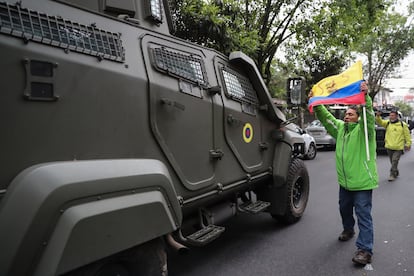Assault on Mexican Embassy in Quito plunges Ecuador into political chaos
Congress is rearming itself around an opposition bloc, arising from its rejection of President Daniel Noboa’s decision to order the raid to detain former vice-president Jorge Glas

If there was one thing Ecuador’s President Daniel Noboa could boast of, it was that he was governing without opposition. In just three months in office, he had managed to persuade Congress to approve almost unanimously the five bills he submitted, all of them campaign promises. The legislators did not vote against even the most thorny projects, such as the law to raise taxes on citizens. The governability pact with the other political movements had consolidated for Noboa a positive image of a leader who had gained control of the country, at least in the legislative branch. This allowed him to mark a distance from his predecessor, Guillermo Lasso, who from the outset of his term broke agreements with the major political groups and led him to hand over the presidency prematurely, decreeing la muerte cruzada (”mutual death,” a combined presidential impeachment and dissolution of Congress) to avoid an impeachment trial championed by the Citizen Revolution Movement (RC) of former President Rafael Correa.
But something broke on Friday, when Noboa ordered the assault on the Mexican embassy in Quito to arrest former vice president Jorge Glas, an unprecedented decision that violated international norms on the inviolability of diplomatic headquarters. One of the most prominent Ecuadorian politicians of the last 20 years, Glas served as vice president under Rafael Correa and later Lenín Moreno, and he came to be in charge of oil resources in a country that experienced dizzying development from the money that rained down from crude. He was one of the most visible faces of the movement that grew around Correa, a populist and charismatic leader who claimed he was leading his country into a form of 21st century socialism. However, Glas fell into disgrace over three corruption investigations launched by the Attorney General’s Office and sought refuge last December 17 in the Mexican Embassy.
Following the embassy breach to arrest him, the first warning arrived from the legislative group of RC which, although it is not pro-government, had a tacit agreement to support the laws promoted by Noboa and thus guarantee governability. “We declare ourselves in opposition within the National Assembly to your government, Mr. Noboa,” said Viviana Veloz, vice president of the Assembly. Although RC holds the most seats in the chamber they are not in a majority on their own, but they are able to garner enough votes from other allied parties to block any government project, as they did with Lasso.
The first maneuver in the political battle already has been made. The ministers of foreign affairs, the interior, and defense have been summoned before the Auditing Commission of the Assembly, most of whose members represent the new opposition bloc. “We are going to initiate the different auditing actions and we are going to present them with the respective requests for impeachment,” said Veloz. And if anything characterizes this Assembly, it is its experience in prosecuting officials. Since 2021, it has presented 22 impeachment requests and two ministers have been censured, according to the Legislative Observatory.
The immediate effect that will be felt by the government is in the 11 questions of popular consultation and referendum that Noboa is promoting. Only 10 movements and parties have registered to campaign and the majority are social groups: no majority political party will campaign for the yes or no vote. Neither RC nor the Democratic Left registered to take a position on a consultation that will among other issues touch upon labor rights, which for decades they were staunch defenders of. “They were going to let the referendum pass, but I believe that RC will campaign behind the scenes against these elections”, says political analyst Esteban Ron.
Even if Noboa wins the consultation and referendum he will be obliged to pass the reforms to the Assembly, where he will encounter a blockade. “This will create a niche discussion to undermine the figure of the president,” adds Ron. For the analyst, polarization has returned to Ecuador’s political landscape and will deepen as the diplomatic and economic consequences of Noboa’s decision to forcefully enter the Mexican embassy to arrest Glas unfold — a move that does little to solve the country’s biggest problem: the insecurity crisis. Violent deaths have begun to increase again, and extortion, kidnapping, and robberies against citizens have doubled.
Sign up for our weekly newsletter to get more English-language news coverage from EL PAÍS USA Edition
Tu suscripción se está usando en otro dispositivo
¿Quieres añadir otro usuario a tu suscripción?
Si continúas leyendo en este dispositivo, no se podrá leer en el otro.
FlechaTu suscripción se está usando en otro dispositivo y solo puedes acceder a EL PAÍS desde un dispositivo a la vez.
Si quieres compartir tu cuenta, cambia tu suscripción a la modalidad Premium, así podrás añadir otro usuario. Cada uno accederá con su propia cuenta de email, lo que os permitirá personalizar vuestra experiencia en EL PAÍS.
¿Tienes una suscripción de empresa? Accede aquí para contratar más cuentas.
En el caso de no saber quién está usando tu cuenta, te recomendamos cambiar tu contraseña aquí.
Si decides continuar compartiendo tu cuenta, este mensaje se mostrará en tu dispositivo y en el de la otra persona que está usando tu cuenta de forma indefinida, afectando a tu experiencia de lectura. Puedes consultar aquí los términos y condiciones de la suscripción digital.








































